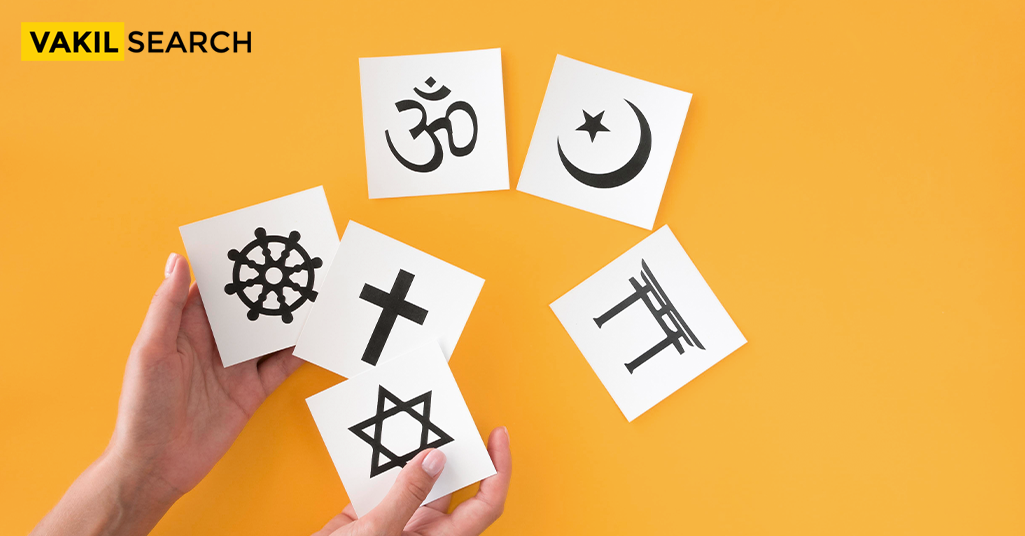Our purpose in writing this blog was to make clear the various religions practiced in India and the benefits and limitations of each religion. To learn more about the importance of religion and pitfalls of religious societies, etc. Continue reading to find out more.
Role of Religion in the Indian Social System: It is no secret that religion is one of the basic organisations that any general public is accustomed to and that is an all inclusive framework. Religion can be defined as an arrangement based on daily faith and respect, ceremonies, customs, and traditions ,which are regular parts of life.
Hinduism, Buddhism, Sikhism, Jainism, Christianity, Islam, and Farsi are some of the major religion in india. Every one of the religions differs in its beliefs or beliefs in its ways.
Religions Primarily Practiced in India are Listed as Follows:
The Hindu Religion
Hinduism is one of the oldest religions in the world. It is unclear exactly how it started. Records indicate that it has existed since the Indus Valley Civilisation.
There are Hindu gods like Vishnu, Brahma, Shiva, Lakshmi, Ganesh, Saraswati, Durga and so on.
Idol worship is a central aspect of Hinduism, where icons are regarded as Gods and sanctuaries hold symbols. Hinduism has a station system and love for many Gods, which makes it a unique religion. Hindu legends include the Ramayana, Bhagavad Gita , and Mahabharata .
As a matter of fact, Hinduism does not accommodate change. People who have a place with another religion cannot be transformed over into a Hindu. Social reformers have attempted to arrange for transformation, but with little success.
Islam
The beauty of this religion is that they believe in one god called ‘ Allah ‘ and they practice islam by the food steps of their beloved ‘Prophet Mohammed ‘ and as mentioned in ‘Quran’ . Islam have five obligatory prayers each day and 30 days fast during the month of ‘Ramzan’ .
Islam has given rights to men and women equally . Though there is certain prohibition to both men and women for their own benefits . The beauty of every religion has its own uniqueness that can be understood with practices.
Many people and celebrities have accepted islam by reading the beautiful holy Quran . Islam has guided and promised to reward each and everyone for their good deeds .
Christianity
Christian faith was established by Jesus Christ. ‘Bible’ is regarded as the heavenly content of Christians. Christians do not have faith in icon art. However, Christians believe in the spot of love in their lives, which is called the church. Christians place a high value on offering prayers to God and helping the poor and infirm.
Sikhism
Guru Nanak was the founder of Sikhism. Guru Granth Sahib is the epic of Sikhism, the spot of love for the Sikhs is known as the Gurudwara. The epic is one of the greatest in the world.
There is a reputation among Sikhs of feeding the poor and having the best heart for all who are in need
Learn more about How Many Religions Are In India?
Role of Religion on Indian Society
All the major religions of the world, including Hinduism, Christianity, Islam, Sikhism, Buddhism and Jainism, can be found in India.
Following are some of the effects of religion on Indian culture:
Oneness
Nearly all people belonging to a particular religion are distinguished from others who do not belong to that religion.
Moral Qualities
A good religion helps promote moral qualities, such as caring for your guardians, protecting your kids, helping the poor and disabled, and demonstrating genuineness.
Taking Control of Society
By instilling certain moral qualities in individuals, religion acts as a powerful tool for social control.
The law is based on the following premises
In time, religious conventions and traditions take on the power of law. According to profound quality, a husband is bound to support his spouse and children. In order to maintain this standard, arrangements for granting upkeep are made when in doubt in the Hindu Marriage Act and Section 125 CRPC.
THE NEGATIVE EFFECTS OF RELIGION
Several issues have arisen in Indian culture as a result of the establishment of religion, such as:
Groupism
As religion divides people, it may hinder a nation’s ability to grow.
Regular Clashes
In India, clashes among different religious groups have become a common occurrence as individuals believe that their religion holds superiority and often attempt to enforce their religious customs on others
Insanity
Certain beliefs within religions can be categorized as superstitious and can impede both the progress of society and of individuals. An illustration of this is the denial of women’s rights in the context of religious doctrines.
Squares Social Change
It can be extremely challenging to change the minds of moderate people, for example, by imposing restrictions on marriage costs, because religion can stand in the way of social change.
Religion is an integral part of an individual’s life despite the negative effects it may have on their lives.
Conclusion
A major issue is not religion itself, but Indians’ strange understanding of it. Hindu divine beings, Allah, and Jesus can help us cope with lamentable circumstances and provide supernatural fulfillment for us. Even so, they cannot protect us from apprehension-based oppressors, build schools, platforms, and lanes that our country so urgently needs.
We need a strong expression that agrees to the Constitution and carries out the necessary tasks. Our state remains incapacitated each time we cheat/pay off/disregard, despite the fact we can ‘wash our wrongdoings away’ or ‘admit to the expert’.
The blog has no intention to hurt someone’s religious feelings . It is important for every person to cherish the beauty of each religion and accept each human being as an individual keeping the religion’s negative clash aside.
Read more,




